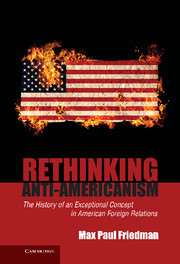Epilogue
The Anti-American Century?
Published online by Cambridge University Press: 05 November 2012
Summary
“Why do they hate us?” It was September 2001. Nearly 3000 people had been killed in a terrorist attack that destroyed New York's tallest buildings, smashed a gaping hole in the Pentagon, and brought down four airliners crowded with travelers. In our shock and pain, Americans, led by the president, asked the question with more urgency than ever before. Here, it seemed, was the tragic fulfillment of the danger posed by anti-Americanism: prejudice and irrational hostility had finally produced a catastrophe whose consequences were incalculable. Soon, commentators and scholars were depicting a continuum of anti-Americanism, beginning with the disdainful accounts of nineteenth-century travel writers, running through twentieth-century political rhetoric, and ending with fiery crashes into the premier symbols of American power.
The question “why do they hate us?” could have led to new insights and more effective ways to confront terrorism, had the word “they” been understood to refer to a small, focused group of terrorists and their active supporters and not to a hostile, anti-American world. Indeed, the initial response of the wider world was a tremendous outpouring of sympathy. As images of the smoking ruin of the World Trade Center were relayed around the globe, American diplomats in Beijing, Berlin, Helsinki, Moscow, Paris, and many other cities could look out their embassy windows and see crowds of ordinary people massing outside not to shout slogans but to place endless bouquets of flowers or hold candlelight vigils deep into the night. A sympathetic French government decreed three minutes of silence in every school and public office in the country. Drivers in Denmark and Germany stopped their cars and stood in respectful silence at noon. Hungarian fire trucks flew black flags of mourning for their fellow firefighters killed in New York. Across Europe, thousands queued up for hours at consulates and hospitals to sign condolence books or donate blood. Even in Tehran, a stadium grew hushed as soccer fans observed a moment of silence despite the official hostility of their regime. To be sure, there were pockets of celebration in Arab communities that held America responsible for their own suffering, including in Iraq and the West Bank – although hundreds of Palestinians also gathered to pray for American victims.
- Type
- Chapter
- Information
- Rethinking Anti-AmericanismThe History of an Exceptional Concept in American Foreign Relations, pp. 224 - 242Publisher: Cambridge University PressPrint publication year: 2012



